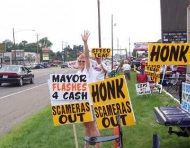4/13/2010
Citizens Around The Country Consider Banning Traffic CamerasResidents of six cities in Maryland, Ohio and Texas circulate petitions to ban automated ticketing machines.

Citizen activists are looking to ban red light cameras and speed cameras in Maryland, Ohio and Texas. Petition drives are under way in six cities with the goal of offering local residents the opportunity to vote in the next election on whether automated ticketing should continue or not. Already, one of these efforts has succeeded.
On May 4, residents of Sykesville, Maryland will vote on whether to overturn the town's photo radar ordinance adopted on February 25. City leaders and traffic camera company lobbyists face an uphill battle as one out of four voters already signed the petition demanding a vote, indicating their distaste for automated ticketing. The referendum would represent the first traffic camera referendum on the east coast.
A referendum is also likely in Baytown, Texas after resident Byron Schirmbeck collected double the required number of signatures to call for a vote. City leaders blocked his first petition on a technicality, and Schirmbeck is circulating an improved measure to ban cameras with the hopes of securing a vote on the November ballot. Likewise, attorney Paul Kubosh is targeting the city of Houston with a proposed amendment to the city charter banning cameras.
"The city of Houston shall not use photographic traffic signal enforcement systems to civilly, criminally, or administratively enforce any state law or city ordinance against the owner or operator of a vehicle operated in violation of a traffic control signal, specified by Section 544.007(d) of the Texas Transportation Code, nor shall it collect any money from any recipient of a Notice of Violation issued, in whole or in part, in connection with the use of a photographic traffic signal enforcement system," the Citizens Against Red Light Cameras petition states.
Kubosh has the uphill task of collecting 20,000 signatures to qualify for the ballot. Port Lavaca activists will have an easier time gathering the 340 signatures required to call a public vote. Organizers created the Facebook group PL Citizens Against Red Light Cameras to publicize their effort.
Ohio has the greatest number of referendum efforts underway, with the Coalition Opposed to Additional Spending and Taxes (COAST), Cuyahoga County for Liberty and Cleveland Tea Party Patriots teaming up as the Camera Removal Team to ban automated ticketing in Cleveland and Garfield Heights. The petition effort will also return to Toledo where a sufficient number of residents asked for a vote, but Redflex and city officials succeeded in blocking the vote on a technicality.
A number of cities have already held referendums on automated ticketing. Last year, eighty-six percent of Sulphur, Louisiana rejected speed cameras. The November elections included three votes: 72 percent said no in Chillicothe, Ohio; Heath, Ohio and College Station, Texas also rejected cameras. In 2008, residents in Cincinnati, Ohio rejected red light cameras. Seventy-six percent of Steubenville, Ohio voters rejected photo radar in 2006. In the mid-1990s, speed cameras lost by a two-to-one margin in Peoria, Arizona and Batavia, Illinois. In 1997, voters in Anchorage, Alaska banned cameras even after the local authorities had removed them. In 2003, 64 percent of voters in Arlington, Texas voted down "traffic management cameras" that opponents at the time said could be converted into ticketing cameras. Photo enforcement has never survived a public vote.


